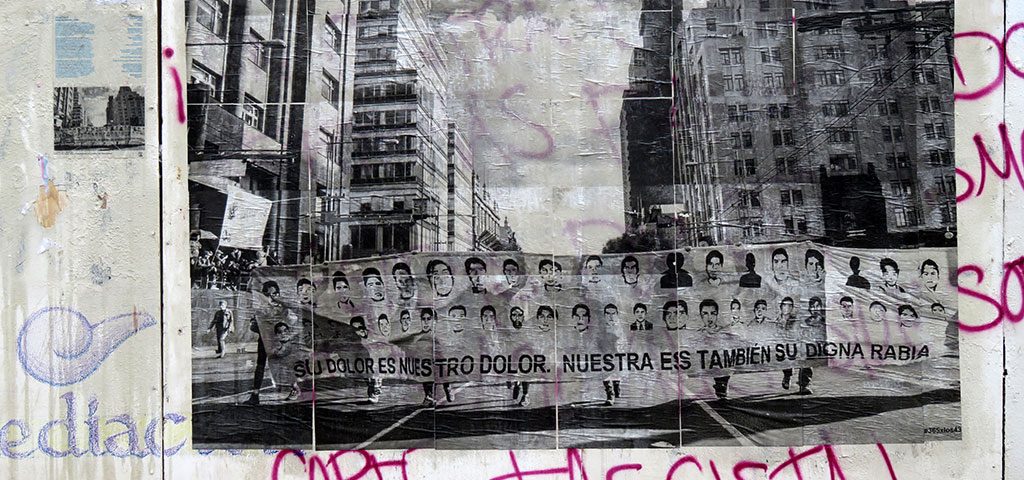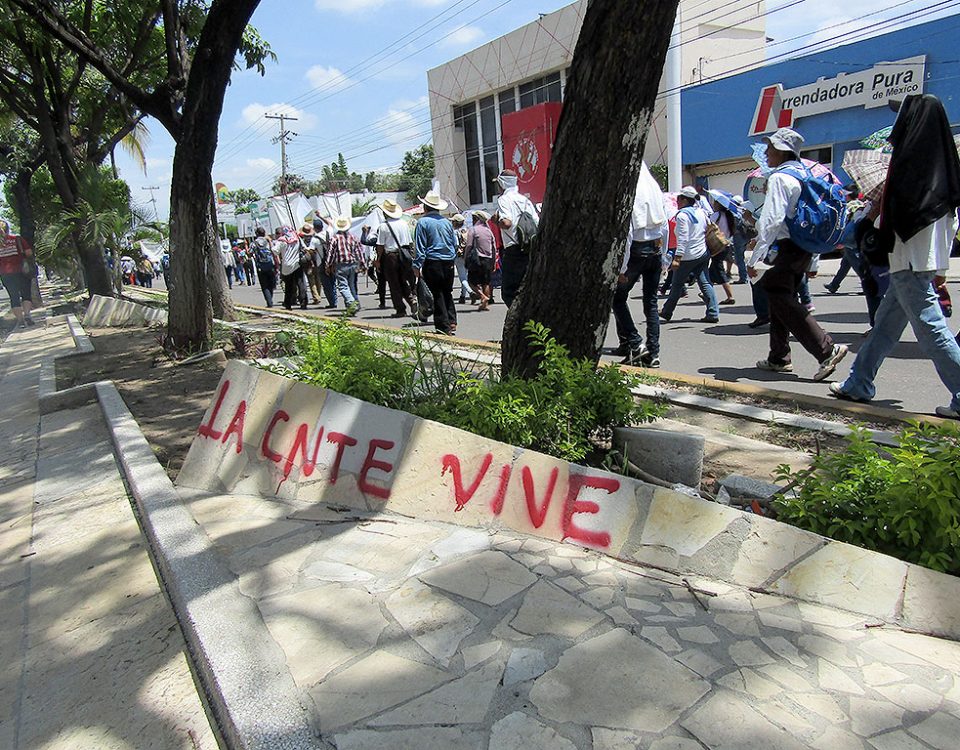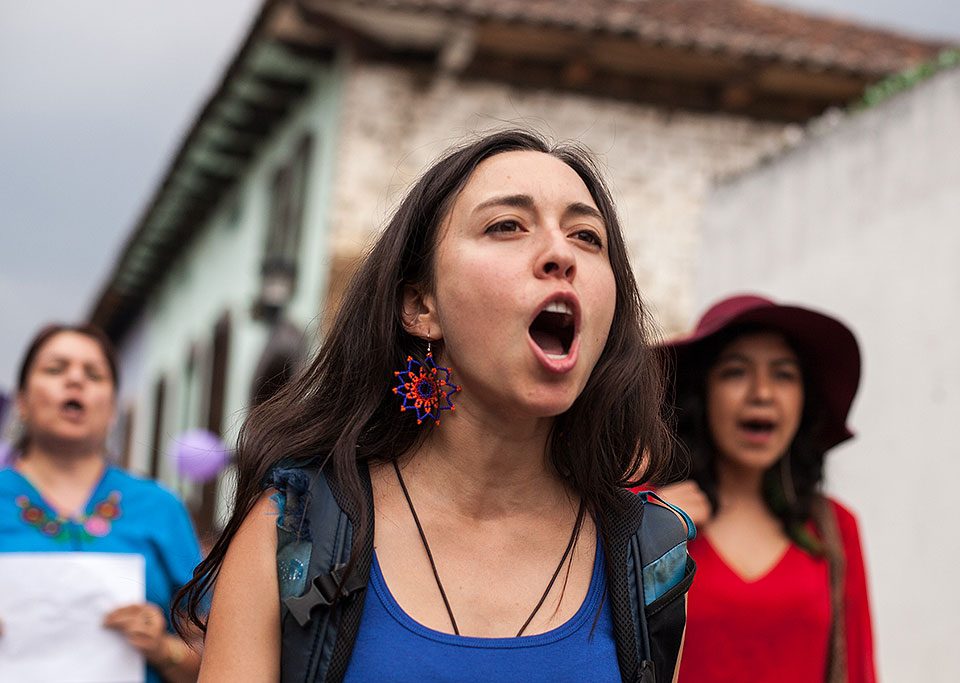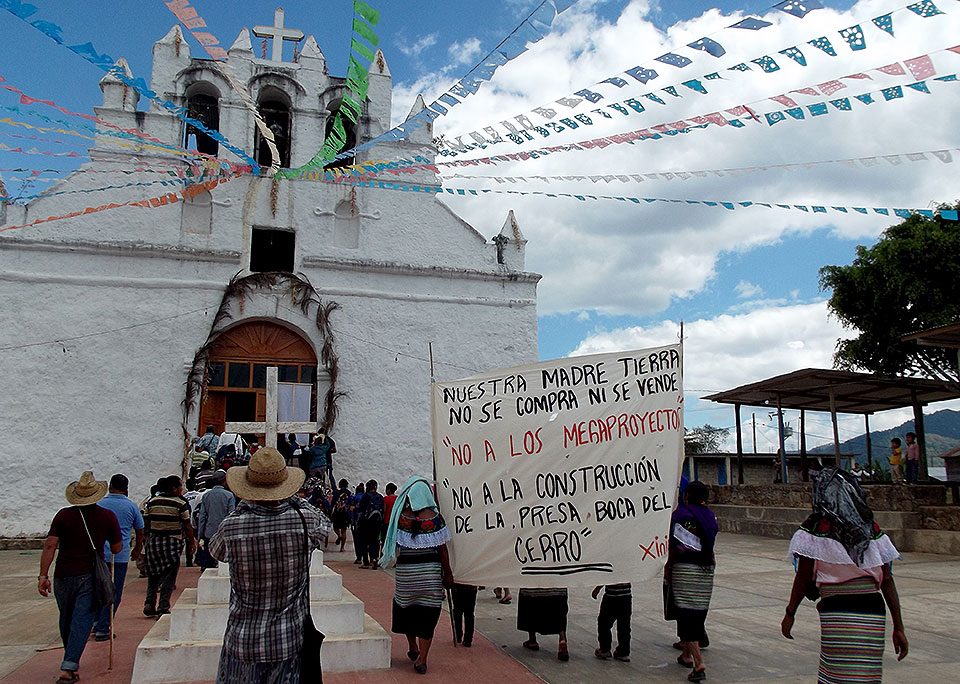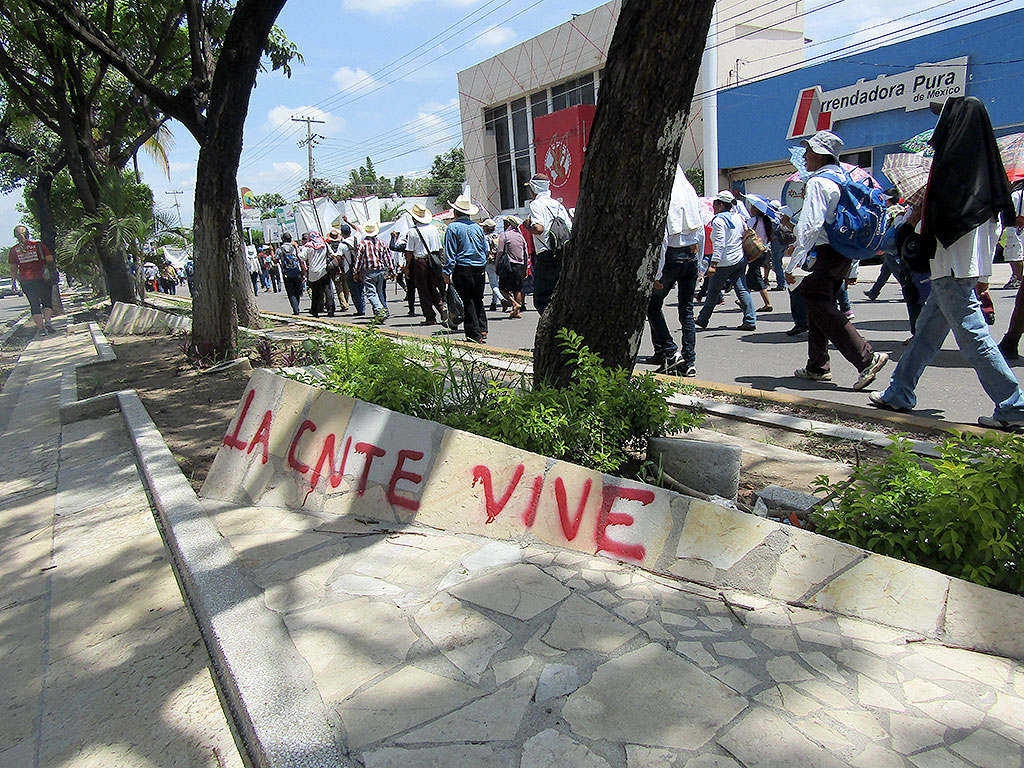
FOCUS: Education Reform and the Teachers’ Struggle – Keys to Understanding the Mobilizations
25/08/2016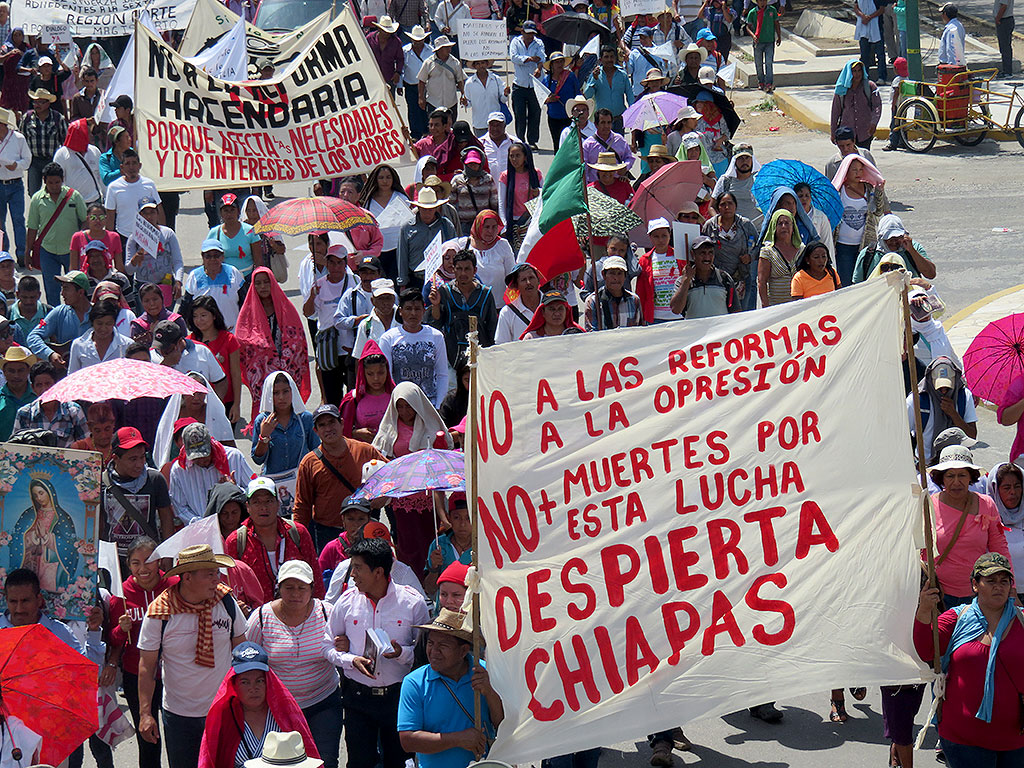
LATEST: Mexico – Teachers Return to Class, Disagreements Continue
09/01/2017The teachers’ movement demonstrations in demand for dialogue with the Ministry of the Interior (Segob in its Spanish acronyms) have been framed in a context of escalating repressive violence.
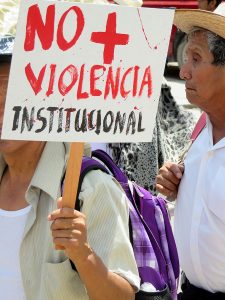
Pilgrimage of the Believing People in solidarity with the teachers’ movement in Tuxtla Gutierrez, Chiapas © SIPAZ
On June 19, in Nochixtlán (Oaxaca), elements of the police violently repressed teachers and other civilians organized against the education reform. In all, nine people were killed, 45 were wounded by gunshots, and two are still missing. Following that act of repression, a negotiating table was set up between the Interior Minister, Miguel Ángel Osorio Chong, and a representation-committee of the teachers. The only agreement made was the decision to clarifythe facts and the reparation of the damages to the families of the deceased. There was not one attempt to address the reform. Therefore, the demonstrations and blockades in Oaxaca and Chiapas remained in place, teachers in Guerrero and Michoacan.
It is worth mentioning that the repression by police forces also caused the death of a teacher in Chiapas in 2015 and two in Guerrero in 2016. Human rights organizations denounced the indiscriminate use of public force, the increase in media campaigns of defamation and criminalization of the teachers, and the arbitrary arrests of at least 75 people, among those are several teachers movements leaders. Some of the people arrested were transferred to high security prisons competent or suitable for serious federal crimes.
At the closure of this report, little progress had been achieved given the government’s refusal to retreat on the education reform (see Focus).
Health Sector, also on Strike
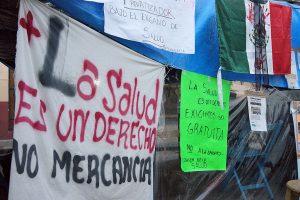
Banners in the permanent sit-in of the Health Sector in San Cristobal de Las Casas, on strike due to shortage of supplies © SIPAZ
In San Cristobal de Las Casas (Chiapas), some 3,000 health workers have been on strike since June 7 over shortages of supplies, lack of staff, and to demand better social benefits. They held two marches and a sit-in outside health installations. At the closure of this report, they still had no positive response to their demands.
On June 22, as the first phase of the new Universal Health System that Enrique Peña Nieto proposed in 2013 entered into effect, the health sector called for a national strike and marched in about 70 cities to demonstrate their rejection of it. The movement #Yosoymédico17 (started in 2014 in Guadalajara, Jalisco, in support of 16 doctors accused of negligence) reported that this new system is actually “a disguised way of privatizing health”.
In the framework of these protests, between June 17 and 21, Article 19 documented 16 attacks on journalists in Oaxaca and Mexico City for reporting on the events, including the murder of Elpidio Ramos Zarate of “El Sur” newspaper in Juchitan, Oaxaca, and four attempted murders.
Other Social Conflicts
According to Proceso magazine, there are more than 250 social conflicts across the country most of which are linked to the National Infrastructure Plan (NIP) (2013). The NIP plans the construction of mega-projects and hundreds of other public works such as 16 new gas pipelines and 21 electricity projects, wind farms,hydro and thermal power stations. In opposition to these plans, at least 52 social and community movements whose protagonists suffer recurrent repression and aggression detonated. The Urgent Action for Human Rights Defenders, the National Campaign Against Forced Disappearances, and the Cerezo Committee considered that these form part of a “strategy of social control of the population.” Given this context, the launch of the National Campaign in Defense of Mother Earth and the Territory, composed of 179 organizations and collectives, was held in Mexico City..
Elections Amid Protests
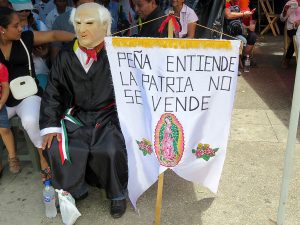
Pilgrimage of the Believing People in solidarity with the teachers’ movement in Tuxtla Gutierrez, Chiapas © SIPAZ
On June 5, elections for governor were held in 12 states, for mayor in 2,445 municipalities, and for local and national constituents in Mexico City. Experts say the results reflect the political map of the presidential election of 2018, highlighting that no party reached 30% of the votes.
The Institutional Revolutionary Party (PRI), currently in office, won five of the 12 governorships. It lost states, that had not known any other political hue for 90 years, to the benefit of the National Action Party (PAN), which won seven governorships (three in alliance with the Democratic Revolution Party (PRD)). Analysts believe the results were due to a punishment vote against the PRI for its corruption, inability to halt insecurity, and the economic crisis.
The PRD suffered a severe electoral setback. The National Regeneration Movement (Morena) did not obtain any governorship either. However, it became the main political force in Mexico City, obtaining 36.2% of the votes in the elections of the Constituent Assembly. Abstention in this election was particularly notable with 71.7%.
The election campaigns were marked by disqualifications between the contenders and lack of transparency in the handling of election expenses. Furthermore, it turned out that in the state of Tamaulipas, considered the most violent in the country, 59 candidates withdrew for fear of reprisals from organized crime.
The Ayotzinapa Case: No Progress
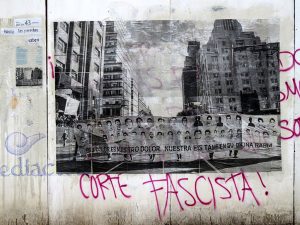
Mural during the cultural event that took place on June 26 in San Cristobal de Las Casas for 21 months of the disappearance of 43 students from Ayotzinapa © SIPAZ
The Interdisciplinary Group of Independent Experts (IGIE) finished its work in Mexico and in its latest report revealed several inconsistencies and omissions in the file of the Attorney General’s Office (PGR in its Spanish acronym) on the Ayotzinapa case. It noted that “the slow response to requests from the IGIE, the delay in many tests, […] the failure to examine other lines of investigation, cannot be seen as simple improvised or partial obstacles. They show structural barriers.” It confirmed the participation of members of the Federal Police and the 27th Iguala Army Battalion in the disappearance. It noted that the PGR presented suspicious evidence: the bones found in the dump at Cocula appeared after an unreported visit; 42 bullet shells were also found.
On April 27, the permanent United States ambassador to the United Nations, Samantha Power, urged Mexico “to take seriously all the recommendations contained in the report”. She emphasized that, “beyond the case of the 43 students, the report reinforces the crucial importance of Mexico’s efforts to strengthen accountability and the rule of law.” This demand adds to those that foreign governments and multilateral organizations have been making for several months. In June, thousands marched in Mexico City, in the Global Day for Ayotzinapa and for the Defense of Public Education. Thousands of teachers, members of other social organizations, and trade unions, among others, took part in the action. Protesters called for the unity of all sectors in order to denounce the federal government’s poor administration of the country.
Soon after, the parents of the 43 students were victims of an attack in a transfer during a trip between Cuernavaca and Mexico City when stones thrown at the bus they were traveling in managed to break two windows. Their lawyer said they have received verbal and text threats for two months, threatening to kill them.
Nor is there progress registered in terms of human rights
In May, the National Human Rights Commission (CNDH in its Spanish acronym) presented a special report revealing that there are more than 35,000 people displaced by violence in the country. The ombudsman, Luis Raúl González Pérez, said the figure could be much higher because “comprehensive, current, and verifiable information does not exist.” Sinaloa, Michoacan, Guerrero, and Chihuahua are the states with the greatest number municipalities displacing people as a result of organized crime.
The Congress of the Union has yet to submit a law on torture and other cruel, inhuman, or degrading punishments. Civil organizations criticized the delay in submission and rejected the “penal miscellany”, a set of reform initiatives to various codes and laws that could lead to acts of torture.
Three soldiers involved in the execution of Tlatlaya (State of Mexico) -perpetrated in June 2014 in which 22 civilians were killed- will not go on trial for alleged lack of “greater evidence”. About 90 organizations said: “this confirms that in Mexico, justice for victims of human rights violations and abuses by elements of the military are very far from being a reality.”
In late June, the report Migration in Transit through Mexico: The Face of an International Humanitarian Crisis was presented by the Documentation Network of Organizations of Migrant Defenders (Redodem in its Spanish acronym). It states that Veracruz, Oaxaca, and Chiapas are the most violent against migrants, and stresses that the Mexican State fails to comply with its obligations to respect the human rights of people in transit.
Analysts Interpret Reforms as Greater Risk of Repression
In March, the Chamber of Deputies approved the Regulatory Law of Article 29 of the Constitution that permits the President of the Republic and Congress to suspend constitutional guarantees against almost any “disturbance to public peace.” It is feared that with this, any social protest could be grounds for canceling rights to freedom of assembly, protest, and expression as well as privacy, information, transit, and communication.
In April, the Chamber of Deputies presented a reform to the Code of Military Justice and a new Military Code of Criminal Procedure that will allow raids to private homes and tapping of citizens’ phone calls. Moreover, it defined that the military are innocent until proven otherwise.
Oaxaca: Beyond the Teachers
The Attorney General of Oaxaca reported that from January to March, 182 intentional homicides, mostly in the Coast region, were registered. According to EDUCA, “the elections in Oaxaca […] are measured by the number of deaths that they drag in their wake, but the political process has a new component: the penetration of organized crime in the elections”.
In Oaxaca there are also conflicts over land, territory, and natural resources. Two studies from EDUCA, based on official data, show that there are 35 active mining projects, 407 mining concessions that have not yet been exploited, and almost 50 hydroelectric projects under study. People and pueblos continue to organize in defense of Mother Earth. For example, in April, the First Ixtepec Regional Forum in Defense of Life and Territory, “You Can Live Without Silver and Gold, Not Without Water.” was held –
The turnout for participation in the elections in Oaxaca was about 59%. After the victory of Alejandro Murat Hinojosa of the PRI-PVEM-PANAL alliance for the governorship with 32% of votes, hundreds of citizens demonstrated in a march called “Oaxaca is Mourning” with a banner asking: “Being governor with 18% of votes. Is this the democracy you offer us? “.
In regards to impunity, the murders of Bety Cariño and Jyri Jaakkola remain unresolved. The widower of Bety Cariño said there will be no justice until all of those involved are in prison (four were arrested in April, nine are still at large). The case was presented before the Inter-American Commission on Human Rights (CIDH).
Chiapas: Another State in Turmoil
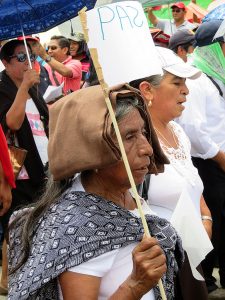
Pilgrimage of the Believing People in solidarity with the teachers’ movement in Tuxtla Gutierrez, Chiapas © SIPAZ
Members of the Chenalhó Pedrano Movement staged a series of protests against the mayor, Rosa Pérez Pérez, throughout the month of April to demand her dismissal for “failing to comply with her campaign promises.” They took over the mayor’s office, the office of the System of Integral Family Development (DIF in its Spanish acronym), blocked access to the municipal capital, and took over the toll booth of the Tuxtla Gutiérrez-San Cristobal de Las Casas highway; they even managed to physically chain down the State Congress, holding its officials for several hours. On May 25, a group of hooded settlers from Chenalhó forcibly entered the diocese of San Cristobal de Las Casas, where a process of negotiation was being held, retained Eduardo Ramirez Aguilar, president of the State Congress and Deputy Carlos Penagos and took them for display in the square of the municipal capital of Chenalhó. Ramirez Aguilar was dressed in the regional attire of a woman as “an act of humiliation.” The next day, the officials were released after the local Congress accepted the resignation of the mayor and appointed Manuel Alvarez Sántiz as a substitute mayor.
The post-electoral violence of this conflict resulted in the death of two people, including a minor. In addition to 80 families in the community of Puebla, “nonconformists over the resignation of Rosa Pérez Pérez had their houses burned and were assaulted” and 14 families of Las Abejas of Acteal Civil Society ended up displaced.
In the municipalities of Oxchuc, Ixtapa, and Frontera Comalapa there similar conflicts occurred after the elections. The Federal Electoral Tribunal (TEPJF in its Spanish acronym) ordered the dismissal of the seven directors of the Electoral Institute and for Citizen Participation of Chiapas for not applying the rules of gender parity in recent elections and for hiring an overseas company to develop an electronic voting system which validated the registration of nearly 17,000 voters in Chiapas abroad without checking that they lived there.
In May, thousands of indigenous peoples of Simojovel mobilized to demand peace and public security in response to violent attacks by a group of between 100 and 150 people from the PRI and the National Campesino Confederation (CNC in its Spanish acronym). Members of the Pueblo Creyente (People of Faith) identified those who for years have been harassing them for opposing drug trafficking, corruption, alcohol business, and caciquismo as the ones responsible.
In terms of land and territory, in April, those displaced from the Poblado of Primero de Agosto denounced the enclosure of the lands they were displaced from in February 2015. They also revealed that they have received threats from ejidatarios from Miguel Hidalgo, members of the Historical Independent Centre of Agricultural Workers and Campesinos (CIOAC-H), “carrying firearms, machetes and all uniformed with yellow caps of the PRD (sic)”. The ejidatarios of Tila denounced provocations from a group of about 100 people “linked to the city hall and the paramilitary group Peace and Justice” shooting high-powered weapons in the air. The Pro Human Rights Center noted that this group attacked “two roadblocks that the ejidatarios set up for security”, pressuring people to join their movement under threat of burning their homes. The ejidatarios reported that one of the them was wounded by a policeman in June, also denouncing constant threats from opponents since the departure of the city council from the ejido of Tila.
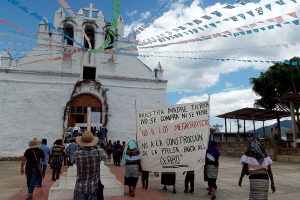
Pilgrimage of the Mission Santísima Trinidad (Arena) and the Committee of Defense of Indigenous Freedoms CDLI Xinich against the oblivion of the massacre of Viejo Velasco and in defense of Mother Earth, Chiapas © SIPAZ
In April, the pilgrimage to remember the massacre of Viejo Velasco and in defense of Mother Earth was held, and it was announced publicly the injunction that was won by the communities of Los Llanos and San José El Porvenir in the municipality of San Cristobal de Las Casas against the project of the San Cristobal de Las Casas-Palenque highway. In May, the parish of Zinacantán also called a pilgrimage against water privatization and the dispossession of its source, due to the threat of the construction of a hydroelectric dam.
Among other human rights issues, in April, the National Front of Struggle for Socialism (FNLS in its Spanish acronym) reported the recent forced disappearance of Fidencio Gomez Santiz, municipality of Altamirano, and the murder of Hector Santiz Lopez of El Carrizal, municipality of Ocosingo. They linked the forced disappearance and killings of its members, and four other people, in Ocosingo to “oligarch interests” in the natural resources of the territory.
Social organizations denounced the forced disappearance of Maximiliano Martinez Gordillo, of 18 years of age, from the community of Tzinil, municipality of Socoltenango, Chiapas. In May, he was detained by people who presented themselves as agents of the National Migration Institute (INM in its Spanish acronym) and unidentified police elements on the route of Comitan to Playa del Carmen, where he was traveling in search of employment. He did not have a a voter registration card, but demonstrated his original birth certificate and CURP (social security number) to prove his Mexican nationality. The INM has denied that it registered Maximilian in the system and has not provided further information to contribute in his search. Human rights organizations fear it could represent a new modus operandi of organized crime.
Guerrero: Violence Continues as Usual in Guerrero
Several reports and denouncements from organizational processes in the state were emitted in the period covered by this report. Seven comuneros, members of the Council of Ejidos and Communities Opposed to La Parota Dam (CECOP in its Spanish acronym) near Acapulco “sustained bullet wounds, beatings, and stoning by two young people from the town of La Conception the night of April 30”, La Jornada reported. The attackers would be related to gravel businessmen with whom the community is in dispute over the exploitation of the Papagayo River.
Six officials of the Regional Coordinator of Community Authorities – Community Police (CRAC-PC) form Ayutla de los Libres were released after nearly three years in prison. They were arrested in 2013, along with Nestora Salgado, commander of the Olinalá Community Police, who was released in March of this year. The Tlachinollan Human Rights Center and the CRAC-PC- San Luis Acatlan House of Justice reported that the detained officials were “criminalized for defending the CRAC-PC security and justice systems” and that the allegations “were made in the framework of their practices of duties as community authority recognized by the Constitution, and international laws and treaties.” However, at least three members of the CRAC-PC are still deprived of their liberty. Nestora Salgado Garcia said that since her release, she and her family have been victims of attacks and threats against them: in May, her daughter’s house was strafed. The protection measures she had been granted by the Mechanism for the Protection of Human Rights Defenders and Journalists the federal government were withdrawn.
Preventing an encouraging process for the organized peoples against mining, the Supreme Court of Justice of the Nation (SCJN) dismissed an appeal moved by the indigenous community of San Miguel del Progreso, who after having achieved the cancellation of mining concessions in its territory questioned the unconstitutionality and unconventionality of the Mining Law. Inhabitants of the community and the Tlachinollan Human Rights Center pointed out that both the Ministry of the Economy, the mining industry, and companies that with concessions sought to avoid a review by the Supreme Court of the mining regulatory framework in force at all costs through the cancellation of concessions.
Otherwise, impunity continues as usual, with the case of the massacre of El Charco (18 years), Aguas Blancas (21 years), and more recently, with the lack of diligent investigation into the facts occurred around election day, June 2015, in Guerrero, where Antonio Vivar Díaz was arbitrarily executed and dozens of people were subjected to arbitrary detention and cruel and inhuman treatment.

